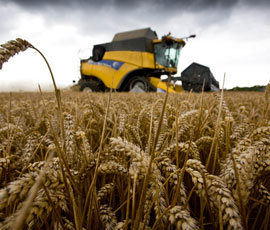Harvest round-up: A regional divide

Harvest progress is displaying a strong regional split, with the South and East reaching completion but plenty left to do in the North and West.
Over the past week, to 28 August, farmers had cut 350,000ha, finally bringing the UK harvest to its mid-way point, according to the latest ADAS report.
Wheat harvest was now 40% through, with yields and specific weights still coming in below average, at 5–10.7t/ha and under 70kg/hl, respectively.
“Progress is being hindered in-field by high volumes of straw with significant green material, slowing harvester speeds, causing blockages and additional work to dry straw before clearing from the field,” it added.
In Kent, Andy Barr was almost 90% through harvest at East Lenham Farm, Maidstone, having finished the wheat in a fortunate run of dry weather.
“We have been pretty lucky,” he said. “We had a good trot of two and half weeks of dry weather, so have made good progress, although I realise we’ve had it a lot better than some.
“Yields will be average to mediocre, but not disastrous. Some of the better fields were yielding terribly, and some of the worst fields have done better than they have ever done.”
Early maturing wheat varieties had performed far better than later varieties this year, according to trials results from Syngenta.
In tests on three sites in East Anglia, earlier varieties had much bolder grain than later crops, which had suffered more from disease pressure, said James Evans, cereals crop team agronomist.
“The early varieties have tolerated the disease pressure better than the later varieties, which has translated through into better quality sample results.”
There wasn’t much to celebrate at Alton Barnes, Devizes, Wiltshire, where Tim Carson was mourning a disastrous harvest.
“Yields have been down about 25%, with Gallant achieving 8.13t/ha and Solstice yielding 7t/ha,” he said.
“We had some wheat accepted for milling but then had three loads rejected today (30 August).”
In Scotland, the combine had been parked up for nearly two weeks on John Hutcheson’s Leckerstone farm, Dunfermline, Fife, following continued wet weather.
“We finished winter barley and rapeseed, but we’re waiting on spring barley and wheat to dry out now,” he said
“The ground is very wet – luckily our combine has tracks so we’ve been alright to travel so far, but it could be worse when we get going again.”

